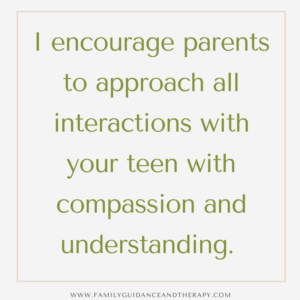There is no doubt that it is a difficult time for both parties. Teens are entering a new stage in their lives where they are developing new needs and wants. Parents on the other hand, are realizing that the little children who once wanted nothing more than to be just like them, now want to be separate and apart. It’s like the teen and the parent are coming from two different worlds…so it’s no wonder that there is often so much miscommunication. I’m here to help decrease some of that miscommunication in hopes of turning what can be an explosive time into one with more understanding, acceptance, and growth.
Here are some steps to help you communicate more effectively with your teen.
1. Understanding the needs of your child: The first step to being able to outwardly effect change is to be able to inwardly effect change, and this stems from understanding why your child is reacting differently to you or behaving in a way that you don’t recognize. Although it may be difficult to feel as though your child is growing apart from you, it’s important to be aware that this is a natural and inevitable stage in your child’s development. Decreasing their dependence on you is necessary, healthy, and will prepare them greatly for the future.
2. Respond with compassion and understanding: I have been on the receiving end of what has felt like unfair rapid fire of accusations and criticisms without any intention of truly trying to understand my feelings. This left me feeling unseen, misunderstood, and angry, which no doubt led to increased hostility and conflict. I encourage parents to approach all interactions with your child with compassion and understanding. This means checking your instinctual, protective reactions at the door, the ones that sound alarms when your child mentions a new love interest or requests a later curfew. If your child is constantly met with intense, reactive responses, no matter how well intentioned, they may feel more inclined to fight back, or worse, they may not want to confide in you again.
3. Listen carefully for the underlying message: What a teen says is often not what a teen means. It can be easy to get hurt by the bite of a teen’s angst and thus take their words at surface value. It may be helpful to remind yourself that it’s not personal and that your teen is in the process of learning how to express his/her emotions. A statement such as, “I wish you weren’t my mom!” may have many possible underlying meanings such as “I feel frustrated that we’re not understanding each other right now,” or “I’m so angry that you embarrassed me.”
4. Find solutions together: Instead of the old “as long as you live under my roof, you will follow my rules” lecture, it may benefit your relationship to join forces and come up with solutions together. Of course, at the end of the day, you are the adult; however, if your child feels as though they are part of the process, it may increase receptivity and acceptance.
If you and your family are struggling with communication challenges, we invite you to come and talk with us. Learn more about our teen and family program here.

